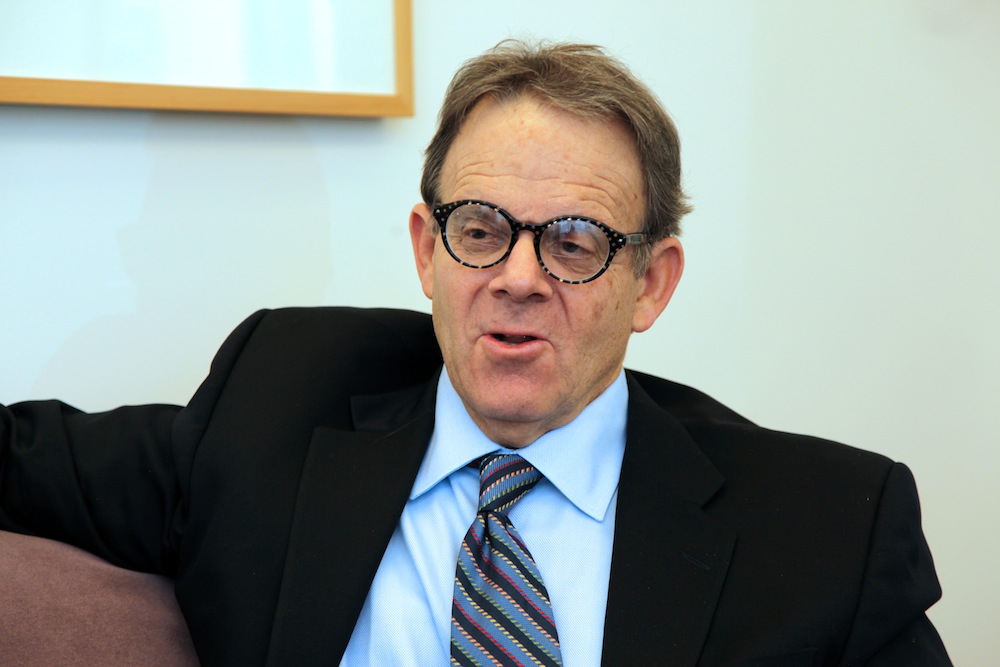
Henry Weinstein is a professor of law and literary journalism at UC Irvine; previously, he spent 30 years as a Los Angeles Times reporter, much of it covering legal affairs around the country. Before moderating a conversation with longtime New York Times Supreme Court reporter Linda Greenhouse, he revealed obsessions with mustard, T-shirts, and doing good in the world in the Zócalo green room.
What would you choose as your theme song?
I’ve always been a great fan of a song called “Wake Up Everybody” by Harold Melvin & the Blue Notes. It came out in the ’70s. It’s very melodic but has a strong political current to it—it talks about responding to social injustice. I’ll take that.
How do you pass the time when you’re stuck in traffic?
I am a voracious listener to books on CD. At the moment I’m listening to Jeffrey Toobin’s new book on the Supreme Court, The Oath. I listen to lots of things—mysteries by George Pelecanos, long historical books like Robert Caro’s biography of LBJ. Books on CD have saved me from getting angry on the freeway many times.
You’ve reported from 36 states; if you didn’t live in California, which state would you choose?
I think if I had to live in another place, I’d probably live in New York City or in New Orleans. I think New York is probably the most vibrant city in the country in terms of its vast array of cultural offerings. And I’m a big jazz fan. New York and New Orleans are the two cities in the country where you can hear great music any night of the week; I don’t know if that can be said of any other city, at least when it comes to jazz.
What’s your favorite secret Southern California spot?
I’m not sure that I have a secret spot, to tell you the truth. I’m a big fan of Laguna Beach, where I first went when I was a small boy. My parents and some other families used to rent these cottages when you could go to Laguna Beach cheaply, when there was a real-life greeter in front of The Pottery Shack. I taught myself to body-surf there. And you can see the ocean from almost anywhere.
Where would we find you at 10:00 on a typical Sunday morning?
You would almost always find me at the Hollywood Farmers Market. It’s about five minutes from my house. My wife and daughter and I have been going there for years. Typically we’ll get lots of fruits and vegetables. There’s also a stand I love that sells grilled chicken and bell peppers on a skewer. I’ll get an organic iced coffee and talk to Tony, the tangerine guy from Ojai. And I’ll eat raw oysters, too. I love the Farmers Market. I think it’s just a great place.
What do you feel conflicted about?
Whether I’m doing enough good. During the 1992 presidential campaign, as you may recall, Bill Clinton took a very severe flaying in the media for ways people thought he manipulated to get out of the draft. It was very striking that in all those interviews, there was not one reporter who asked Clinton if he thought he had not done enough to stop the war. I look at people who stand up—I look at David Harris, who went to prison for two years. I was opposed to the war and marched in a lot of demonstrations, but I wasn’t that courageous. So I often ask myself, am I doing enough good, and am I being a good enough husband or parent?
If you had one more hour in the day, what would you do with it?
More reading and more listening to music, probably.
What’s your favorite condiment?
I am a total mustard freak. It’s a standing joke in my family that I normally have 10 to 12 mustards of various kinds. I will put mustard on almost anything. It will certainly make a piece of celery more appealing and liven up cottage cheese in the morning.
What do law and journalism students have in common?
Curiosity. And in many instances—not all instances—a desire to do good. But I think intellectual curiosity and the ability to mentally unpeel onions.
What are you keeping in your closet that you should have thrown out already?
My wife would tell you hundreds of old T-shirts, many from baseball stadiums I’ve been at, or from demonstrations in the ’60s. I have more T-shirts than mustards, and that’s saying something.



